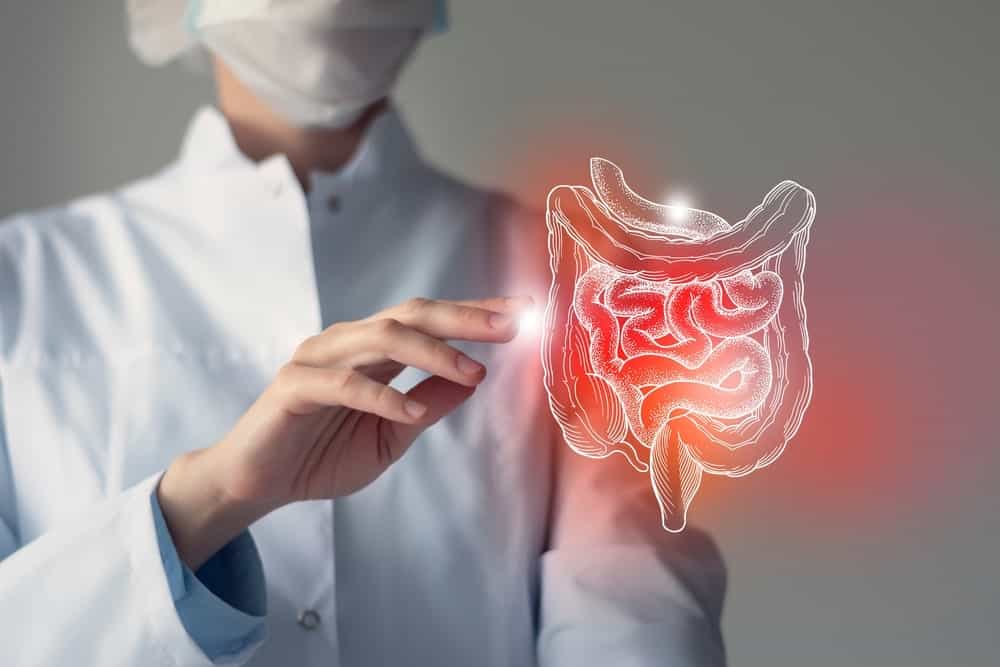The digestive system plays an integral role in providing the body with the necessary nutrients and energy by breaking down the food that is consumed. When your gut health is good, you are less likely to experience any adverse effects that can impact your quality of life. In order to enhance your digestive health, this article will walk you through some essential dietary and lifestyle modifications compiled by our Consultant Gastroenterologist, Dr Benjamin Yip, at Alpha Digestive & Liver Centre.
The Digestive System

Nutrients, including carbohydrates, proteins, fats, and vitamins and minerals are essential for the body for growth and cell repair as well as to gain energy. The digestive system is responsible for breaking down the food, so that it can be absorbed into the bloodstream. But what exactly is the digestive system, and how does it work?
The digestive system, also known as the GI (gastrointestinal) tract or alimentary canal, comprises vital organs such as the oral cavity, pharynx, oesophagus, stomach, small and large intestines, rectum, and anus. A number of accessory glands are also associated with this system, including the salivary glands, liver, gallbladder, and pancreas. These glands produce digestive fluids and enzymes that help digest food and liquids consumed.
Digestion commences from the oral cavity, where food is chewed and moistened with saliva so that it is easily swallowed. Saliva contains an enzyme known as amylase, which helps with breaking down complex starches. The food that is swallowed is then pushed further down into the oesophagus by wave-like muscle contractions called peristalsis, which propels the food into your stomach.
The main function of the stomach is digestion, and it contains essential acids and enzymes that help with this process. Once the digested food reaches the small intestine it absorbs the necessary nutrients and water with the help of certain bacteria and digestive juices, including bile and pancreatic juice. More water is then absorbed by the large intestine, and once the remaining nutrients are absorbed, the remaining waste products are eliminated in the form of stools.
Digestive Health: What You Need to Know
Digestive disorders are commonly found worldwide, and almost every individual comes across a digestive concern that may necessitate a visit to a gastroenterologist. Apart from causing certain gut problems, an unhealthy GI tract can contribute to a range of conditions, including autoimmune diseases, endocrine disorders, and cardiovascular disease. It can also impact one’s mental health, so it is essential to adopt good dietary habits and lifestyle changes to strengthen your immune system and avoid facing any adverse consequences.
Here are some common conditions that may occur as a result of poor gut health:
- Diabetes
- Irritable bowel syndrome (IBS)
- Inflammatory bowel disease (IBD) – Crohn’s disease and ulcerative colitis
- Thyroid problems
- Rheumatoid arthritis
- Systemic lupus erythematosus (SLE)
- Multiple sclerosis
Here are some telltale signs that may indicate an unhealthy gut:
- Fatigue
- Migraines
- Bloating and discomfort
- Constipation or diarrhoea
- Poor sleep
- Food intolerances
- Food cravings
- Weight management issues
- Skin concerns
- Mood problems
Keeping Your Digestive System Healthy - Advice from a Gastroenterologist
Incorporate more fibre-rich foods and probiotics
Vegetables and fruits contain essential nutrients and antioxidants that can help maintain a healthy gut microbiome. Fibre-rich foods are also beneficial in aiding digestion and relieving constipation. Furthermore, adding probiotics to your diet will promote the growth of healthy bacteria, which can be obtained from natural food sources like yoghurt, kefir, sauerkraut, and kimchi.
Limit the intake of processed foods and refined sugars
Many gastroenterologists advise maintaining a balanced diet and avoiding excessively processed foods, as they can lead to inflammation and change the gut microbiota as well. The consumption of such foods and refined sugar can increase the risk of certain chronic medical conditions like diabetes (type 2) and inflammatory bowel disease. Moreover, processed red meat, in particular, can increase the risk of heart disease and cancer.
Drink lots of water
Staying hydrated is crucial in maintaining good bowel health and preventing constipation. It is important that you make sure to drink at least eight glasses of water each day. However, the ideal quantity of water required will vary depending on factors such as gender, weight, activity level, weather, and general health condition.
Stay active
Exercising regularly and maintaining a healthy weight is good for both your physical and mental health. Being active can reduce stress, enhance your immune system, promote good digestion, and keep illness at bay.
Get adequate sleep
Poor sleep can impact the body negatively and contribute to poor gut health. It can also increase the risk of obesity, stress and other mental health problems, as well as a number of other health conditions.
Identifying food sensitivities and tolerances
Food intolerances are commonly found worldwide, and lactose intolerance is something many Singaporeans struggle with. Patients with this condition cannot digest the milk sugars present in milk and dairy products, which occurs due to a deficiency of the enzyme lactase. If you are suffering from certain digestive problems, we recommend you consult a reliable Gastroenterologist in Singapore to check for food sensitivities or tolerances, as that could be the main culprit for your issues.
Cultivate mindful eating habits
As a Consultant Gastroenterologist who has treated countless patients with gastrointestinal disorders, Dr Yip has observed that some patients are unaware of or do not practice mindful eating habits. But what is mindful eating, and how can it help you? Mindful eating, as the term implies, requires a person to slow down and be present in the moment. This means one must not eat while multitasking! While it may be convenient to eat on the run while completing your daily tasks, mindful eating requires you to focus on your food and engage in the sensory experience of eating. This will enable you to be more aware of any internal body cues so that you can gauge if you are hungry or full. Mindful eating will also help you make good food choices to lead a healthier life.
Summary
The gastrointestinal tract plays an impactful role in maintaining any individual's physical and mental well-being. Therefore, it is essential to incorporate healthy eating habits and lifestyle changes to help you have a healthier gut and an enhanced quality of life.
Frequently Asked Questions
What is a Gastroenterologist?
A Gastroenterologist is a doctor who specialises in the diagnosis and treatment of digestive disorders and diseases.
Why should you consult a Gastroenterologist?
A Gastroenterologist can help with the management and treatment of several digestive concerns that may not be able to be treated by a general physician. Feel free to read our blog post on When Should You See a Gastroenterologist for more information.
What are the common procedures carried out by Gastroenterologists?
Here are some of the commonly performed procedures by these specialists:
- Gastroscopy
- Colonoscopy
- Endoscopic Ultrasound (EUS)
- Endoscopic Retrograde Cholangiopancreatography (ERCP procedure)
What can you expect at your first visit to a Gastroenterologist?
At your initial consultation, a detailed medical history and physical examination will be performed to come to the correct diagnosis. But in order to confirm the diagnosis, certain investigations such as haematological tests, ultrasound scans, CT scans, MRI scans, motility studies, and various other tests may be required.
Is there a specific age that requires you to visit a Gastroenterologist?
Well, almost any patient with digestive disorders can consult a Gastroenterologist to seek help, but if you are over the age of 45, it is advisable to visit a good gastrointestinal health clinic to carry out colon cancer screening. This is essential because the majority of colon cancers occur in individuals over 50 years or older.
Do I need to see a Liver specialist or a Gastroenterologist to get my liver checked out?
Well you may consult a Gastroenterologist as they are trained in managing liver problems because the liver is an integral part of the digestive system. They also specialise in treating other organs involving the digestive system, including your biliary organs such as the pancreas and gallbladder. If you are seeking a reliable and experienced Gastroenterologist to help you, look no further than Alpha Digestive & Liver Centre. Alongside a committed and dedicated team, our Consultant Gastroenterologist, Dr Benjamin Yip, will ensure that you receive the proper treatment and care for all your digestive concerns and needs.
References
- Gastroenterology Consultants of San Antonio. “12 Ways to Improve Your Digestive Health”, 17 November 2021, https://www.gastroconsa.com/12-ways-to-improve-your-digestive-health/
- Digestive Health UK. “Top tips to improve your gut health”, 1 October 2022, https://digestivehealthuk.com/blog/top-tips-to-improve-your-gut-health-every-day/
- Anna Christovich, Xin M. Luo. “Gut Microbiota, Leaky Gut, and Autoimmune Diseases”, 27 June 2022, https://www.ncbi.nlm.nih.gov/pmc/articles/PMC9271567/
- Marcelo Campos, MD, Contributor. “Food allergy, intolerance, or sensitivity: What’s the difference, and why does it matter?”,30 January 2022, https://www.health.harvard.edu/blog/food-allergy-intolerance-or-sensitivity-whats-the-difference-and-why-does-it-matter-2020013018736
- Harvard T.H. Chan. “Mindful Eating”, https://www.hsph.harvard.edu/nutritionsource/mindful-eating/

